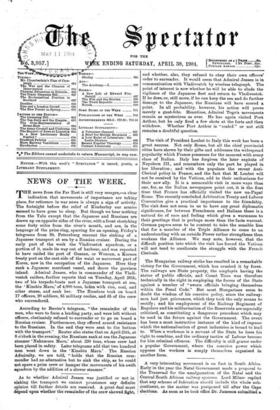The Hungarian railway strike has resulted in a remarkable victory
for the Government, which has crushed it by form The railways are State property, the employes having the status of public officials, and Count Tisza was therefore technically in the right in employing the forces of the State against a number of "sworn officials bringing themselves within the Penal Code." But most Hungarians seem to doubt the wisdom of his coercive policy, since the railway- men had just grievances, which they took the only means to rectify ; and his employment of the Railway Regiment of Regulars and his militarisation of the Reservists are especially criticised, as constituting a dangerous precedent which may be used in the future against the Government. The event has been a most instructive instance of the kind of impasse which the nationalisation of great industries is bound to lead to. When a workman is a servant of the State he loses his right to combine, and the ordinary tactics of Labour become for him criminal offences. The difficulty is still graver under a popular Government, where the coercive power which opposes the workers is simply themselves organised in another form.






















































 Previous page
Previous page